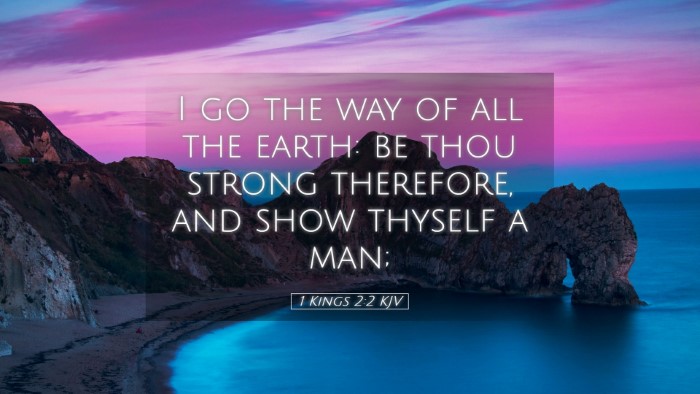Commentary on 1 Kings 2:2
Verse: "I go the way of all the earth: be thou strong therefore, and shew thyself a man."
Introduction
This poignant verse encapsulates the final words of King David to his son Solomon as he prepares to depart from this life. David's charge to Solomon serves as both a personal appeal and a national directive, highlighting the gravity of leadership and the responsibilities that come with it. Through a combination of insights from historical and theological perspectives, this commentary aims to delve deeper into the rich meanings encapsulated in this verse.
Contextual Background
As David approaches the end of his reign, he reflects on his life, his legacy, and the impending transition of power to Solomon, who is to become the new king of Israel. This transition is marked by both opportunity and the pressing need for strong leadership during a pivotal time in Israel's history.
Exegetical Insights
The verse contains several key components that merit exploration:
- "I go the way of all the earth": This phrase acknowledges the inevitability of death. David is not only recognizing his own mortality but is also imparting a universal truth about human existence. Adam Clarke notes that this reflects the transitory nature of life and serves to remind Solomon of his mortality as well (Clarke, 1 Kings 2:2).
- "be thou strong therefore": David's exhortation to Solomon underscores the necessity of strength in leadership. Matthew Henry emphasizes that this strength must be both moral and spiritual, as it is the foundation upon which successful rulership is built (Henry, 1 Kings 2:2).
- "and shew thyself a man": This imperative calls for Solomon to embrace his identity and responsibilities. Albert Barnes interprets this as a call to courage, integrity, and action, inviting Solomon to demonstrate his maturity and resolve as he takes on the burdens of kingship (Barnes, 1 Kings 2:2).
Theological Themes
This verse introduces several significant theological themes that are vital for pastoral and scholarly reflection:
- The inevitability of death: Reflecting on mortality leads to a deeper appreciation for life’s purpose and the stewardship of one's legacy. The wise rulers of Israel, like David and Solomon, who recognize their eventual end, position themselves to lead with a sense of urgency and purpose.
- The nature of leadership: David's charge emphasizes that true strength in leadership comes not only from power but also from wisdom, courage, and character. This notion aligns with biblical definitions of leadership which focus on servanthood rather than authoritarian rule.
- The call to moral integrity: Solomon’s need to “shew thyself a man” highlights the biblical expectation of leaders to act uprightly, making decisions based on righteousness and justice, which are core attributes of God Himself.
Practical Applications for Pastors and Leaders
In applying the truths of this verse to contemporary ministry and leadership, several principles emerge:
- The importance of preparing successors: Like David, current leaders must invest in the next generation, providing them with the wisdom and insight necessary for future challenges.
- Modeling strength and integrity: Leaders ought to embody the characteristics they wish to see in their followers, demonstrating strength rooted in faith and moral courage.
- The need for vigilance against complacency: Recognizing one’s own mortality should fuel a sense of proactive stewardship and responsibility in fulfilling God-given duties.
Conclusion
1 Kings 2:2 is laden with meaning for today’s leaders, embedding timeless truths within its historical narrative. As David urges Solomon to embrace strength and manhood, modern-day leaders are similarly called to recognize their vital roles in guiding and shaping future generations. Through God’s grace, they can strive toward authentic, impactful leadership that honors both their legacies and responsibilities.


